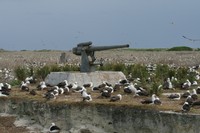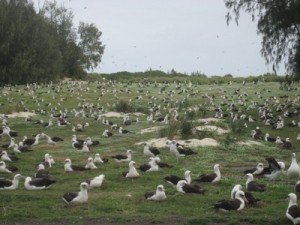I’ve been to a number of places where wild animals are trusting of humans, but perhaps none so unlikely as Midway Atoll. After more than a century of abuse at the hands of man — first being slaughtered for their feathers by hunters, then being paved over by Seabees, then shelled by the Japanese during World War II, and finally Osterized by the engines of the planes of the U.S. Strategic Air Command during the Cold War — the albatross and other birds don’t seem to bear a grudge. Maybe that’s because they’ve won.

Albatross have succeeded where the Japanese military failed and have successfully taken over the island. And, they did it in a way that Mahatma Ghandi would applaud – through passive resistance. It’s only fair since they have ancestral rights to Midway (or whatever it’s called in Albatross-speak), but it’s still both eerie and wonderful to see how the birds have been able to enforce an avian eminent domain and build their nests on every available open space, including the middle of the island’s paths. Even more moving is the gracious way in which we humans have surrendered control and allowed the establishment of a republic of birds.

For the most part it’s a peaceable nation, and the citizens are irresistible, albeit short. I’ve discovered that it’s impossible not to talk to them as I make my way around the island on foot or on bike. For their part, the albatross make we humans feel like superstars as we pick our way among them. The combined effect of tens of thousands of birds clacking in the background makes it seem as though our every move is accompanied by polite applause from a very large crowd.
Their curiosity and clumsiness on land make them endearing. Every day, our group trades stories of heart-stopping take-offs as birds flap their wings and run wildly down impromptu runways that open in the middle of the nesting area. More often than not they inadvertently step on a nesting bird at some point during take off, eliciting an indignant squawk. The concept of zoning doesn’t seem to have taken hold in bird land, although there are a couple of paths to the beaches that the albatross use for a more official runway, and the albatross using these runways even line up and (mostly) take turns.
Landings are even more dramatic. If you’re an albatross, every landing seems to be an emergency landing. Unless there’s a stiff wind to land into, they have to put on the brakes immediately on touch-down, and quite often this ends up in a face plant, if not a collision with another hapless bird.

In the air, though, they are magnificent, even heroic, and their life style would appeal to both feminists and the most fire-breathing moralists. Feminists would have a hard time finding fault with males who pitch in and take over care of the baby immediately after hatching while the mom gets a chance to rest up. Albatross may be one of the few species where spouses are actually an asset, rather than a clumsy menace, around newborns. On the other hand the “values” crowd might find inspiration in their commitment to monogamy since the birds mate for life.
All in all Midway today is a happy place. The few humans working here or visiting here all care deeply about restoring the atoll as the haven for wildlife. God knows the albatross need it. Between the plastics that get into their digestive systems when they feed, to the impacts of global warming, the albatross run a gauntlet of threats during their life on the high seas. Once back on the atoll, however, at least for the moment, they find a haven where humans have turned the infrastructure of war and conflict towards their betterment. They’ve managed to get a superpower as a protector and they don’t control a drop of oil — no mean trick for a birdbrain. That’s an auspicious augury at the dawn of the 21st century.
